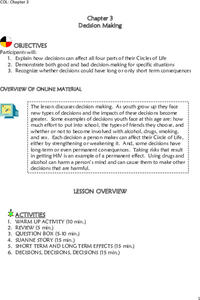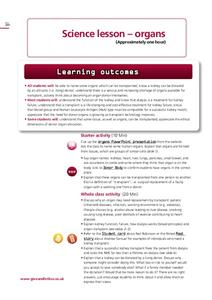American Chemical Society
Density: Sink and Float for Liquids
We don't think of liquids as floating typically, but a quick look at any oil spill tells a different story. Lesson explores various densities of liquids and why this fact is important. After observing the density variation, scholars...
American Chemical Society
Surface Tension
A drop of dew holds a sphere shape even when sitting on a seat thanks to the surface tension of water. Learners observe the phenomena of surface tension in water. Through demonstrations, hands-on activities, and discussions they explore...
American Chemical Society
Preparation and Combustion of Biodiesel
The United States is the world's largest producer of biofuel. During an in-class investigation, young scientists produce their own biodiesel. They burn a sample of it to determine the heat of combustion. Then they discuss the results...
PBS
Stories of Painkiller Addiction: The Cycle of Addiction
Drug addiction, including prescription drug addiction, begins with a reason that's different for every user. High schoolers learn more about the reasons people begin abusing drugs with a set of videos and worksheets that discuss four...
American Chemical Society
Why Does Water Dissolve Sugar?
Did you know that if you wait long enough, the M on the outside of an M and M will float to the surface when submerged in water? Learners observe the sugar coating of an M and M while it is dissolving in water. They explain how this...
Social Skills Central
Ready, Set, Respond!
When faced with a difficult situation, do you respond selfishly, face it head on, or ignore the problem? This game encourages learners to evaluate the wide range of reactions we can have to problematic situations, and how our responses...
NOAA
Watch the Screen!
Can a sponge cure cancer? Life science pupils visit the drugstore under the sea in the fifth lesson of six. Working groups research the topic then get hands-on experience by testing the inhibiting effects of several plant extracts on E....
Heritage Foundation
The Amendment Process and the Bill of Rights
Did you know that lawmakers have proposed more than 5,000 bills to amend the US Constitution in Congress? Your class learns intriguing facts about the process of choosing amendments. A variety of activities including before and after...
DiscoverE
Building with Biology
Seeing is believing! Bring DNA to life for young biologists using a simple extraction lab. Individuals extract the DNA from wheat germ, then place it in a microcentrifuge tube for observation. They thread yarn or other material through...
Department of Education (Ireland)
Understanding Influences
"Understanding Influences," a richly detailed, carefully scaffolded unit, asks middle and high school scholars to examine how internal and external factors like friends, media, and society influence their attitudes and behaviors.
PBS
Using Primary Sources: Wide Open Town
A picture speaks a thousand words, no matter how old! Scholars use political cartoons from the era of Prohibition and the Temperance Movement to analyze what, a primary document (in this case, a bootlegger's notebook) is telling them...
Healthy Native Youth
Chapter 3: Decision Making
By way of group discussion, reading, and role-play a series of six activities encourage scholars to make responsible decisions. Following an online introduction, pupils review the concept of volition and answer questions. Middle...
Teach With Movies
Title: "Pygmalion" - Topics: Drama/England; World/England
“What do you mean that my language is improper?” Prior to My Fair Lady was Pygmalion. Fair Eliza’s struggles with English, which according to George Bernard Shaw “is not accessible even to Englishmen,” come alive in the 1938 film version...
Curated OER
The Juvenile Death Penalty
Sensitive material is discussed in this lesson. Please review to ensure that the content is suitable for your class. The topic is the Eighth Amendment and how the U.S. Supreme Court makes determinations about what constitutes cruel and...
Starry Night Education
Comets and Meteors
Comets are also known as dirty snowballs or icy mud balls. With your super scientists, create a model comet nucleus to discover how they are made and take part in a scientific discussion to learn how it behaves.
University of the Desert
Why Is Cultural Diversity a Positive Thing?
From more empathetic individuals to greater tolerance in government, learners explore the benefits of a culturally diverse world through a series of collaborative, discussion-based activities.
Social Skills Central
Don't Get Mad...
Pupils discover important alternatives to expressing anger and how to better manage their emotions through a collaborative discussion activity with their classmates. This resource includes nearly 100 (99, to be exact!) hypothetical...
Olomana School
Mixtures and Solutions: Paper Chromatography Experiment
Why does some ink bleed through paper, and other ink doesn't? Practice some paper chromatography to separate the colors from a pen with an interactive experiment for middle and high schoolers. Learners use a variety of solutions to track...
The New York Times
Super Brand
Children can recognize popular brands from an early age, but these images symbolize much more than what they advertise. Take a journey through the design of a logo with a lesson that focuses on the history and ubiquity of the Super Bowl...
Give and Let Live
Blood and Transplant: Organs
Who donates organs, and how do organ donations work? The third lesson in a four-part series discusses the tremendous need for donor organs of all ages and backgrounds. A variety of materials, included with the teacher's guide, walk...
PBS
Stories of Painkiller Addiction: Contemplating Nature vs. Nurture
Does having an addict in your family make it more likely to become one yourself? Explore the genetic risk factors, as well as the prominent environmental influences, for substance addiction in a lesson that encourages awareness and open...
PBS
Stories of Painkiller Addiction: Commitment to Recovery
Recovery from substance addiction is an ongoing process. The final lesson in a series about painkiller abuse and addiction prompts learners to research various recovery options before writing a short story about a character who is going...
National Institute on Drug Abuse
The Brain's Response to Drugs
Marijuana affects the brain differently than inhalants, which have a different effect than opioids. Elementary and middle school classes read about these drugs as well as nicotine, methamphetamine, hallucinogens, and steroids before...
Institute for Humane Education
In Your Face: Reclaiming Billboards
Ads here, ads there, ads everywhere—but what do they communicate? Pupils discuss this topic and develop a list of personal values. They then work as creative directors at an advertising firm to create billboards that reflect community...
Other popular searches
- Alcohol Awareness
- Drugs and Alcohol
- Alcohol Abuse
- Drugs & Alcohol
- Alcohol Abuse Powerpoint
- Alcohol Advertising
- Affects of Alcohol
- Alcohol Drugs
- Alcohol and Drug Prevention
- Drug and Alcohol
- Fetal Alcohol Syndrome
- Alcohol and Drug Abuse

























